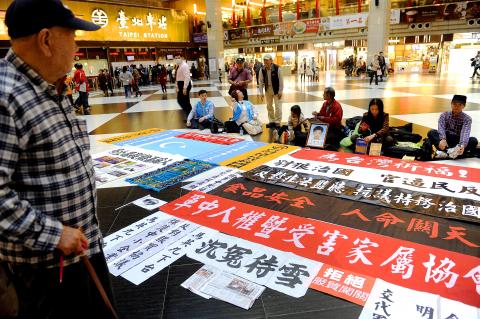The Taiwan Friends of Uighurs (TFU) has joined the cause voiced by the World Uyghur Congress (WUC) in calling for an end to the Chinese government maltreatment of Uighurs by staging a sit-in demonstration at Taipei Main Station.
The group, founded in June last year, said it received a call from WUC president Rebiya Kadeer on Friday afternoon informing it of the worldwide demonstration that has been scheduled to take place in Taiwan, Germany, Japan, Netherlands, Sweden, US and Canada between Friday and tomorrow.
According to a statement on the congress’ official Web site, the demonstration “seeks to draw attention to the Chinese government’s systematic human rights violations, especially extrajudicial killings, against Uighurs in East Turkestan,” also known as the Xinjiang Uighur Autonomous Region.

Photo: George Tsorng, Taipei Times
“We are hoping that the event will raise awareness of the suffering of the Uighur people under China’s rule among the Taiwanese public,” TFU executive director Marie Yang (楊月清) said yesterday.
“The Chinese government has continued to suppress minorities in China. Tibetans have received more public attention due to their world-renowned spiritual leader, the Dalai Lama, but Uighurs’ plight is less well known,” she said.
The relative inattention might have to do with the branding of the WUC by the Chinese government as a terrorist-related separatist organization and its leader “an ironclad separatist colluding with terrorists and Islamic extremists,” according to the Chinese Communist Party’s People’s Daily, along with the Taiwanese government’s ban on Kadeer’s entry into the nation in 2009 citing “security concerns.”
Yang called the accusation baseless.
“The WUC’s office is just a block away from the US Congress and the organization has also received funding from the US government,” Yang said.
TFU chairman Paul Lin (林保華) said there were at least 10 known incidents of bloodshed in the restive western autonomous region last year, adding that they were “bloodshed” rather than “terrorist attacks” as described by some Taiwanese, Hong Kong and overseas Chinese media repeating the Chinese government’s stance.
“However, the Chinese government has failed to ferret out a single gun from the resisting Uighur people in these ‘terrorist attacks.’ All they found were machetes, other kinds of knives and the so-called improvised explosive devices that were simply bottles filled with oil,” he said.
Lin mentioned an incident in 2012 that was claimed by the Chinese government to be a “hijack attempt,” which was in fact simply “a fight between six Uighurs and some Han Chinese on the plane.”
Two Uighur passengers died as the result of the fight, and the other four were arrested, of which three have since been executed, Lin said.
“The Chinese report later claimed the Uighurs involved had carried explosives onto the plane, but withdrew the accusation after receiving protests from the ground crew, who would be held accountable for negligence if the allegation was true.”
The Han people involved were praised as heroes and lavishly rewarded, which Lin described as “hush money.”
Lin called on Taiwanese to be aware of the human rights violations in China, especially at a time when Western democracies are bowing to Beijing’s economic power.

Alain Robert, known as the "French Spider-Man," praised Alex Honnold as exceptionally well-prepared after the US climber completed a free solo ascent of Taipei 101 yesterday. Robert said Honnold's ascent of the 508m-tall skyscraper in just more than one-and-a-half hours without using safety ropes or equipment was a remarkable achievement. "This is my life," he said in an interview conducted in French, adding that he liked the feeling of being "on the edge of danger." The 63-year-old Frenchman climbed Taipei 101 using ropes in December 2004, taking about four hours to reach the top. On a one-to-10 scale of difficulty, Robert said Taipei 101

Nipah virus infection is to be officially listed as a category 5 notifiable infectious disease in Taiwan in March, while clinical treatment guidelines are being formulated, the Centers for Disease Control (CDC) said yesterday. With Nipah infections being reported in other countries and considering its relatively high fatality rate, the centers on Jan. 16 announced that it would be listed as a notifiable infectious disease to bolster the nation’s systematic early warning system and increase public awareness, the CDC said. Bangladesh reported four fatal cases last year in separate districts, with three linked to raw date palm sap consumption, CDC Epidemic Intelligence

Taiwanese and US defense groups are collaborating to introduce deployable, semi-autonomous manufacturing systems for drones and components in a boost to the nation’s supply chain resilience. Taiwan’s G-Tech Optroelectronics Corp subsidiary GTOC and the US’ Aerkomm Inc on Friday announced an agreement with fellow US-based Firestorm Lab to adopt the latter’s xCell, a technology featuring 3D printers fitted in 6.1m container units. The systems enable aerial platforms and parts to be produced in high volumes from dispersed nodes capable of rapid redeployment, to minimize the risk of enemy strikes and to meet field requirements, they said. Firestorm chief technology officer Ian Muceus said

MORE FALL: An investigation into one of Xi’s key cronies, part of a broader ‘anti-corruption’ drive, indicates that he might have a deep distrust in the military, an expert said China’s latest military purge underscores systemic risks in its shift from collective leadership to sole rule under Chinese President Xi Jinping (習近平), and could disrupt its chain of command and military capabilities, a national security official said yesterday. If decisionmaking within the Chinese Communist Party has become “irrational” under one-man rule, the Taiwan Strait and the regional situation must be approached with extreme caution, given unforeseen risks, they added. The anonymous official made the remarks as China’s Central Military Commission Vice Chairman Zhang Youxia (張又俠) and Joint Staff Department Chief of Staff Liu Zhenli (劉振立) were reportedly being investigated for suspected “serious